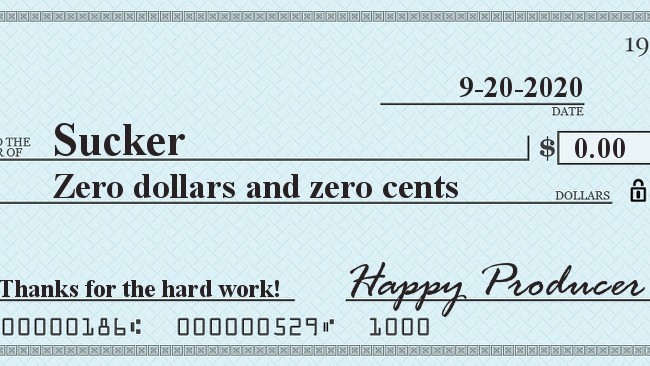
RedShark Replay: Been asked to provide your services for free lately? Andrew Johnstone on the insidious nature of The Culture of Free.
 Don't work for free if you want to see this stuff in the future
Don't work for free if you want to see this stuff in the future
Recently, I took some pictures of an old friend’s restaurant for a magazine article on a quid pro quo basis: he got some free pictures, I got a free meal out of it. All well and good. What you may not know is that that exchange has to be accounted for under UK tax laws, and while that formality rather takes the gloss of what feels like a decent trade between friends, at least there is an equitable deal going down. Which is not always the case.
The shoot goes well, the client is happy and his PR is over the moon. The picture is sent to the magazine.
A couple of days later, the PR gets in contact again: she has written a piece about the restaurant for the local newspaper, can she send them the photo? “Well yes, but see if you can get a fee out of them”, says me. “Not a cat’s chance in hell, you’ll be lucky to get a credit”, says the PR.
I can only speculate on the reasons why the local paper might not even give me a byline, but I expect the answer would be that it is ‘not company policy’. This is odd, because in my time as a freelance photojournalist I know that we all lived and died by our bylines, calling cards for the next assignment. Even the prickliest photo-editor understood this would insist on a proper credit for their shooters. My suspicion was that in this case the paper wanted to pretend to its readers that it was still gathering its own news, generating its own content, rather then being fed titbits by the PR industry. Whatever the reason, I know that I am now being fleeced by the “Culture of Free”.

The Culture of Free is an insidious beast that has seen the steady erosion of work for freelancers and even salaried employees. The rationale behind not paying people properly for the work that they produce is always trots itself out in one simple phrase “we don’t have the budget”. “But hang on a minute”, I want to say, “your entire business model is predicated on the ability to supply your clients with a service that relies on delivering content or product or what ever it is, how can you tell me that you “have no budget”?”
The fact is that businesses know that they can get content for free, so they simply don’t need to bother paying for it. The press, and especially the regional press, with its commitment to online editions now relies heavily on free content from PR companies. I know this as I write little press stories for our local Scout group and no matter what the news is, it is always published. So is the internet the catalyst for demise of the freelancers fee? Well if Andrew Keen is to be believed then the answer is ‘yes’.
Keen has written extensively about the culture and is certain that The Internet is not the Answer. The web has engendered the culture of free, encouraging users to share content while the aggregators like Facebook, Twitter (and the rest), who gratefully gobble up this free media, paying nothing for the raw materials, yet trousering millions in salaries and share options as they re-package the content, bundle in some advertising and feed it back to us. It’s a business model that is now being mimicked by organisations that once paid wages for a days’ work.
I loose film work for businesses with multi-million pound turnovers to people who are doing the projects 'for their portfolio'. I am asked to speak to fee-paying students at college for free. I am required to throw in my camera kit for practically nothing on films for broadcast clients. It is relentless. And I don’t need to go far for a straw poll of other freelancers beset by the same problems. My wife, a freelancer translator, is constantly asked to do free jobs to help agencies pitch for new work from clients or by charities that pay six figure sums to their CEOs. A successful screenwriter friend reports similar abuse.
And it is not just here in the UK where the Culture of Free pervades. In a recent essay in Medium, Michael Goldfarb in the US points out that “even the most liberal institutions do all they can to avoid taking on full-time employees. At universities, an army of adjunct professors provide an estimated three-quarters of undergraduate teaching.”
And then there are the interns and the food-banks and the charity workers and the list goes on and on, even Hollywood A-listers seem to be struggling to get work. Of course as far as the creative industries are concerned we may just be witnessing the death-throes of certain professions. This is not unusual, plenty of professions have bitten the dust before now – think of all the coopers, thatchers, tanners, weavers and even coal miners that used to be gainfully employed. Yes, some of these trades were poorly paid with people barely earning a living wage, but at least some remuneration was involved!
But the culture is now threatening even the most secure professions – teachers, accountants and lawyers. Why pay for a lawyer to draft a contract for you when you can download a standard form from Rocket Lawyer? Why pay a teacher’s salary when classes can be delivered via iPad…”You haven’t mentioned the music business”, the readers scream. Well to be fair to musicians, they have been making a noise about this issue for a long while now in their fight against streaming, while other professions remain silent, but yes “the musicians”.
As consumers the short term benefit of all of this is terrific – lots of free stuff, but what are the long-term implications? I mean if none of us are getting paid, how will we be able to afford to pay for the stuff that is never actually given away for free?
Tags: Business


Comments